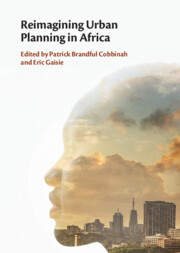Book contents
- Reimagining Urban Planning in Africa
- Reimagining Urban Planning in Africa
- Copyright page
- Contents
- Contributors
- Foreword
- Preface
- Acknowledgements
- Abbreviations
- Part I Understanding Sustainable Urban Planning in Africa
- Part II Case Studies on Urban Planning in African Countries
- Part III Sustainable Urban Planning in Africa
- 14 On the Need for Sustainable Digital Urban Infrastructure in Twenty-First-Century South African Cities
- 15 The South African Landownership Struggle
- 16 The 2030 Agenda, Climate Urbanism and Urban Planning in Zimbabwe
- 17 Urban Planning and Quality of Life of Urban Residents in Africa
- 18 Realising Rights in Complex Informal Settlements Contexts
- 19 Participatory Design Won’t Fix Unequal Southern African Cities
- 20 Enabling Smart Mobility in African Cities
- 21 On the Future of Urban Planning in Africa
- Index
- References
16 - The 2030 Agenda, Climate Urbanism and Urban Planning in Zimbabwe
from Part III - Sustainable Urban Planning in Africa
Published online by Cambridge University Press: 07 December 2023
- Reimagining Urban Planning in Africa
- Reimagining Urban Planning in Africa
- Copyright page
- Contents
- Contributors
- Foreword
- Preface
- Acknowledgements
- Abbreviations
- Part I Understanding Sustainable Urban Planning in Africa
- Part II Case Studies on Urban Planning in African Countries
- Part III Sustainable Urban Planning in Africa
- 14 On the Need for Sustainable Digital Urban Infrastructure in Twenty-First-Century South African Cities
- 15 The South African Landownership Struggle
- 16 The 2030 Agenda, Climate Urbanism and Urban Planning in Zimbabwe
- 17 Urban Planning and Quality of Life of Urban Residents in Africa
- 18 Realising Rights in Complex Informal Settlements Contexts
- 19 Participatory Design Won’t Fix Unequal Southern African Cities
- 20 Enabling Smart Mobility in African Cities
- 21 On the Future of Urban Planning in Africa
- Index
- References
Summary
The chapter seeks to understand how the 2030 Agenda expressed through the Sustainable Development Goals (SDGs) and climate urbanism reconfigure urban planning and related processes in Zimbabwe. As discourses of climate change and sustainability have gained traction, urban planning plays a critical role in achieving carbon-free societies. Through the case study of three Zimbabwean cities (Harare, Bulawayo and Gweru), the chapter aims to highlight opportunities and challenges presented to urban planning by Agenda 2030. The chapter employs primary and secondary data sources to understand how urban planning in Africa, and particularly in Zimbabwe, is being shaped by the climate discourse. As such, the chapter contends that there is a seemingly discernible paradigm shift in terms of urban planning processes in Zimbabwe, which seems to be drifting towards a multilateral planning vision dominated by climate-centred urban planning policies. It must be noted that climate-centred urbanisation will be useful in future in curbing and dealing with pandemics like COVID-19. However, it should be noted that climate-centred urban planning processes seem to be more abstract thinking than operationalisation. Finally, the chapter suggests ways to promote a pragmatic shift from abstract thinking to operationalisation of climate-friendly urban planning.
- Type
- Chapter
- Information
- Reimagining Urban Planning in Africa , pp. 282 - 302Publisher: Cambridge University PressPrint publication year: 2023

